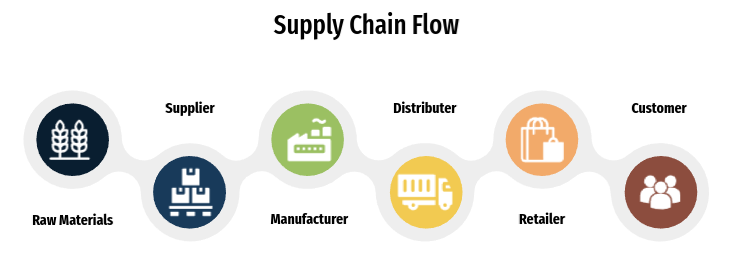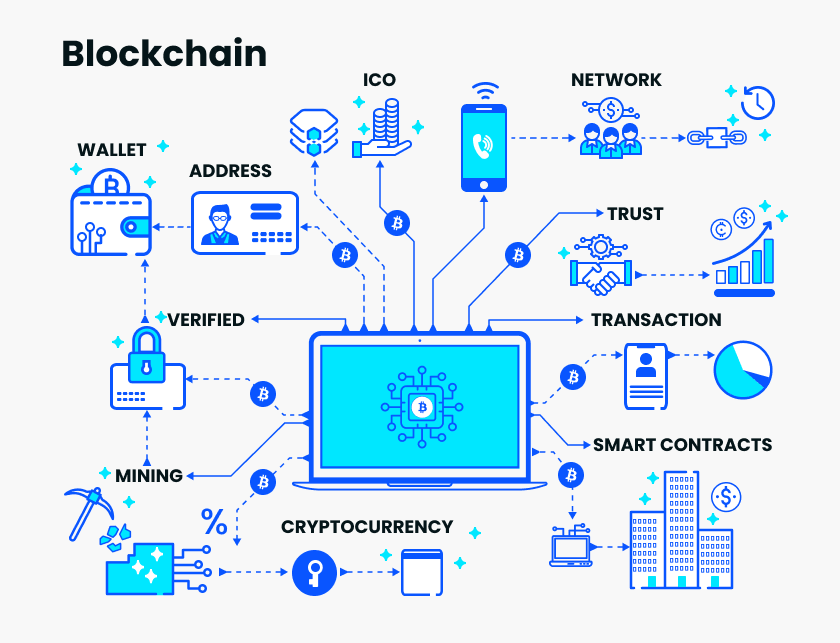The digital world never stops amazing us, and applications of blockchain technology are at the heart of this new era. Imagine a future where every item you buy comes with an unbreakable trust seal, each pill you take is traceable right to its maker, and the deed to your house is locked safe in an invisible vault that only you can open. That’s not a scene from a sci-fi movie—it’s a taste of reality as blockchain reinvents our everyday transactions. From the depths of supply chains to the peaks of financial markets, we’re seeing transformations that seemed impossible a decade ago. Stick with me as we explore seven mind-blowing ways blockchain is unlocking the future, making our world more transparent and secure.
Enhancing Supply Chain Visibility and Security
Cutting-Edge Supply Chain Tracking Technologies
Imagine you order a product online. You might wonder, “Where did it come from?” By using blockchain, we can track and trace products from their source to our front door. Each step is recorded on a blockchain. This is a secure and unchangeable form of record-keeping.
How does blockchain improve supply chain tracking technologies?
Blockchain lets each part of the supply chain talk to each other. It’s like a group chat for producers, shippers, and stores. They all see the same information. They can’t change it. This means you can trust that your product really came from the place it says it did.
Blockchain in supply chains is more than a tech trend. It stops fake goods from being sold. It also helps in making sure that the products are stored right. If food needs to be cold, blockchain systems can check the temperature history. If it got too warm, the system alerts everyone.
Ensuring Product Authenticity with Blockchain
Fake products can be a big problem. How do we know if something is real or not? Blockchain has an answer. Let’s think about handbags, for example. A real one can cost a lot. A fake – not so much. With blockchain, each bag gets a digital badge. This badge can be checked on a blockchain. When you buy the bag, you can look up the badge. If it’s on the blockchain, it’s real. If not, it might be fake.
Why is blockchain good for checking product authenticity?
It’s because blockchain records are permanent and open. Once information goes in, it can’t be changed or deleted. This means that a product’s story – where it’s from, who made it, and where it’s been – gets locked in.
So, with a quick scan using a smartphone, we can check a product’s history. This keeps people from selling fakes. It’s a powerful tool for companies and customers alike.
Blockchain helps make supply chains safer and more honest. This tech is changing how we buy and trust our products. It brings peace of mind to shoppers. It’s not just a record in a computer. It’s a promise of a better and more trustworthy shopping experience.
Revolutionizing the Healthcare Sector
Empowering Healthcare Data Management
Imagine going to a doctor and they can pull up your whole health history fast. This is now possible due to blockchain. Using this tech, we keep health records safe and easy to share. You can think of blockchain as a secure digital notebook that no one can mess with. Each page is a block of data that links to the last, making a chain. This setup keeps data safe from hackers and loss.
This method means patients own their health info. They can choose who gets to see their records. Hospitals and clinics can now swap info without risking privacy. Often health care runs slow and costs a lot. Yet, blockchain speeds things up and cuts costs. We use smart contracts – self-run digital contracts – to automate tasks. This limits mistakes and saves time.
In short, blockchain lets us manage health data with more care. It ups security and makes sharing info easy and fast.
Advancing Drug Traceability and Safety
Next up, let’s see how blockchain makes medicine safer. Fake drugs are a huge problem. They put lives at risk and cost a lot. Blockchain helps by tracking a drug’s journey from maker to patient. We call this ‘supply chain tracking’. Each step in this journey gets logged on the blockchain. Since it’s secure and transparent, we can see where drugs really come from.
Think of blockchain as a stamp of truth on our meds. It confirms that they’re the real deal. And if any issues arise, we can quickly find out where things went wrong. This lowers the risk of fake meds getting to us.
Blockchain doesn’t just stop fakes. It also helps recall harmful drugs fast. It can track bad batches of medicine back to the source. This quick action saves lives and builds trust with patients.
So, when we add blockchain to healthcare, we up safety. We dodge fakes and keep our meds in check. It’s all about less risk and more trust for everyone.
Reinventing Financial Systems
Strengthening Financial Transactions Security
Blockchain is changing how we keep money safe. It’s like a super-strong safe that no one can break into. When we send or get money, it makes sure no one can steal it. Banks are starting to use this too, which makes our money even safer.
Blockchain works by storing data in blocks that link together. Once a block fills with data, it links to the previous block. This creates a chain that is very hard to change. If someone tries to mess with one block, they would have to change every block after it. This takes a lot of power and is nearly impossible to do. That’s why blockchain is so good at keeping our money safe.
Transforming Cross-Border Payments with Blockchain
People often send money to others in far places. Traditionally, this takes time and costs a lot. But blockchain is changing that too. It makes sending money across the world fast and cheap. Blockchain does this by letting people deal directly with each other. They don’t need a bank in the middle anymore.
Imagine you want to send money to a friend on the other side of the world. With blockchain, you use digital currency, like Bitcoin. You can send this money in a snap, and your friend gets it fast. They can then trade the Bitcoin for their local money. Before blockchain, your friend would have to wait and pay fees to banks. Now, thanks to this smart system, everyone can save time and money. This is huge for people who work far from home and send money back to their families.
Blockchain doesn’t just move money, it moves it with details that keep it secure. You can see every step of your money’s journey. No more mystery about where your money is or when it will get there. Plus, blockchain helps stop fraud. It does that by recording every transaction in a way that no one can change. This brings trust into the picture. You know that what you’re sending or receiving is exactly what you expect.
In short, blockchain is really shaking up how we handle money. From keeping it safe to sending it around the world, it’s making everything easier. We’re just beginning to see how it will change things. But one thing is for sure; it’s a big win for everyone.
The Rise of Smart Contracts in Various Industries
Streamlining Real Estate Transactions
Buying a home is a big step. It’s often slow and filled with paper. Here’s a game changer: smart contracts. They’re like vending machines. Imagine this: You put in money and out comes a property deed, no extra steps needed. Blockchain makes this dream real. With smart contracts, we cut down waiting times and say goodbye to piles of paperwork.
Smart contracts on blockchain bring trust to the table. No one worries about foul play when a deal is clear to all. Everyone sees changes, so mistakes are rare. This means fast, safe, and fair deals for everyone.
Blockchain in real estate? Yes, that’s right. Say you want to sell your house. Now, you and the buyer agree on a price. The smart contract holds the deal. No one can change it, not even a sneaky third party. Money and deeds swap when all terms are met.
But it’s not all about sales. Renting gets easier too. A smart contract checks payments. No rent means a lockout system steps in. All this, automated, with no need for a middleman. Think how much time that saves! Plus, blockchain use cases in this field are on the rise. It’s clear to see why the excitement is real.
Automating Intellectual Property and Royalty Management
Creators, musicians, writers, rejoice! No more waiting for your hard-earned cash. Smart contracts make paying royalties automatic. Make a song, get it on platforms, and see your wallet grow with each play. This method is fair, traceable, and lightning-fast.
Blockchain tracks who owns what. If others use your work, you see it. They use, you get paid. It’s that simple. This tech ensures creators get their due share. And it’s not just for music. Think bigger! Art, books, even software code. All safe, all tracked.
Intellectual property thrives with blockchain. It stamps every creation with a digital fingerprint. This proves you’re the mind behind the magic. Plus, it fights theft. No one can claim your work as their own when blockchain backs you up.
Handling patents and royalties is also simpler. You make it, you patent it. Then, sell or license as you please. Every deal and cent goes through smart contracts. This means fast payments, no errors, and happy creators.
To sum it up, blockchain use cases are endless. From houses to hymns, this tech changes the game. It’s not just talk; it’s happening now. Industries see the light. They’re joining the blockchain revolution. And you know what? It’s just the beginning.
In wrapping up, we’ve seen how blockchain is changing the game in several fields. From making supply chains more clear and safe, to upgrading how we handle health data and track drugs for safety. It helps make money transfers secure and eases payments across borders. And it’s not just about money; it shakes things up in real estate and helps artists get their dues without a fuss.
This tech is huge and it’s only going to get bigger. It makes things we rely on every day better and safer. Every industry is feeling its impact, and it’s clear that embracing blockchain means paving the way for a smarter, more connected future. I’ve seen it in action, and I am telling you, it’s a game-changer. Keep an eye on it!
Q&A :
What are the most innovative uses of blockchain technology beyond cryptocurrency?
Blockchain technology has been at the forefront of innovation far beyond its initial application in cryptocurrency. Notable uses include supply chain management, where it enhances transparency, and smart contracts, which automate agreements without intermediaries. Additionally, blockchain is transforming voting systems to prevent fraud, protecting intellectual property rights, and even revolutionizing the healthcare industry by securely managing patient records.
How can blockchain technology transform the financial industry apart from Bitcoin?
Blockchain is transforming the financial industry by offering decentralized finance (DeFi) solutions which aim to democratize finance by removing control from centralized entities. It also underpins secure, real-time, and cost-effective international money transfers, streamlines clearing and settlement processes, and provides a robust system for identity verification and fraud prevention.
In what ways is blockchain technology empowering the supply chain sector?
Blockchain technology is greatly empowering the supply chain sector. It provides end-to-end visibility and a single source of truth for all stakeholders, facilitating the tracking of goods from origin to delivery. Blockchain’s decentralized nature also helps in reducing fraud, increasing efficiency, and enabling the verification of authenticity for products, which is particularly important in the fight against counterfeit goods.
What role does blockchain technology play in enhancing cybersecurity?
Blockchain technology plays a critical role in enhancing cybersecurity through its inherent properties. Its decentralized structure distributes data across a network, making it less susceptible to hacking and data breaches. Immutable record-keeping ensures traceability and accountability, while advanced encryption techniques provide an additional layer of security for sensitive data.
How is blockchain technology revolutionizing the healthcare industry?
Blockchain technology is revolutionizing the healthcare industry by providing a secure framework for managing patient data. It ensures the integrity of health records while enabling interoperability between various healthcare systems. Blockchain also facilitates the secure transfer of patient medical records, protects against unauthorized access and tampering, and could potentially streamline insurance claims processing and reduce fraudulent activities.




